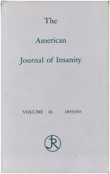Complicated grief and bereavement-related depression as distinct disorders: preliminary empirical validation in elderly bereaved spouses
Abstract
OBJECTIVE: This study sought to determine whether a set of symptoms interpreted as complicated grief could be identified and distinguished from bereavement-related depression and whether the presence of complicated grief would predict enduring functional impairments. METHOD: Data were derived from a study group of 82 recently widowed elderly individuals recruited for an investigation of physiological changes in bereaved persons. Baseline data were collected 3-6 months after the deaths of the subjects' spouses, and follow-up data were collected from 56 of the subjects 18 months after the baseline assessments. Candidate items for assessing complicated grief came from a variety of scales used to evaluate emotional functioning (e.g., the Hamilton Depression Rating Scale, the Brief Symptom Inventory). The outcome variables measured were global functioning, medical illness burden, sleep, mood, self-esteem, and anxiety. RESULTS: A principal- components analysis conducted on intake data (N = 82) revealed a complicated grief factor and a bereavement-depression factor. Seven symptoms constituted complicated grief: searching, yearning, preoccupation with thoughts of the deceased, crying, disbelief regarding the death, feeling stunned by the death, and lack of acceptance of the death. Baseline complicated grief scores were significantly associated with impairments in global functioning, mood, sleep, and self-esteem in the 56 subjects available for follow-up. CONCLUSIONS: The symptoms of complicated grief may be distinct from depressive symptoms and appear to be associated with enduring functional impairments. The symptoms of complicated grief, therefore, appear to define a unique disorder deserving of specialized treatment.
Access content
To read the fulltext, please use one of the options below to sign in or purchase access.- Personal login
- Institutional Login
- Sign in via OpenAthens
- Register for access
-
Please login/register if you wish to pair your device and check access availability.
Not a subscriber?
PsychiatryOnline subscription options offer access to the DSM-5 library, books, journals, CME, and patient resources. This all-in-one virtual library provides psychiatrists and mental health professionals with key resources for diagnosis, treatment, research, and professional development.
Need more help? PsychiatryOnline Customer Service may be reached by emailing [email protected] or by calling 800-368-5777 (in the U.S.) or 703-907-7322 (outside the U.S.).



